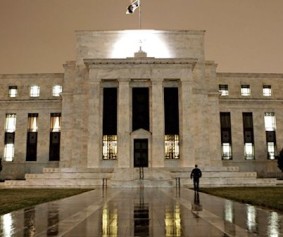I don’t know about you, but I am happy that the two-year rate game by the Fed is finally over. The markets apparently agree that it was high-time the Fed charade about raising rates was over – stocks rallied strongly after yesterday’s announcement that the Fed Funds rate would be raised to 0.25%-0.50%.
What the market was saying by rallying after the Fed’s decision, in my opinion, is that it was long overdue to get this matter settled. Think about it: Then Fed Chairman Ben Bernanke first began warning of an impending end to QE and the first rate hike back in 2013, and the stock markets tanked at least temporarily. Bernanke quickly backed off of that idea and deferred the decision to incoming Fed Chair Janet Yellen.
Yellen officially ended QE in October of last year, and then the debate over the first rate hike began. Note: we’re talking about over a year ago that the Fed began preparing us and the markets for the first hike in the Fed Funds rate. For all of this year, Fed officials hinted at a rate hike repeatedly, but didn’t follow through.
There was talk of a rate hike ahead of the March policy meeting. There was even more ahead of the June policy meeting. And yet more ahead of the September meeting. And even more ahead of the October meeting. Yet at each juncture, the Fed failed to enact what it called “lift-off.”
As I predicted in my E-Letter on Tuesday, Yellen & Company voted yesterday to raise the Fed Funds rate from 0.00%-0.25% to 0.25%-0.50% yesterday. So the drama of the Fed’s first rate hike is finally over. The Fed’s failure to make this decision for over a year is a mystery and is clearly unacceptable, in my opinion. In any event, the uncertainty is over for at least another couple of months.
The Fed’s policy statement after yesterday’s decision emphasized that the FOMC will take a “gradual” approach to subsequent rate hikes. This also explained the rise in the equity markets following yesterday’s lift-off decision.
While the initial stock market reaction to the rate hike yesterday was positive, it remains to be seen what the medium-to-longer-term reaction will be. There is no doubt that QE and the zero-bound Fed Funds rate drove equity values to new high after new high since the bottom in early 2009. Yet since QE ended in October of last year, and we are now clearly into a rate hiking cycle, it is unclear what the next trend in equity prices will be. I’m not optimistic but I could be wrong.
So where does the Fed see short-term interest rates going from here? Not that it matters because no one knows what lies ahead, but here are the latest policy committee members’ Fed Fund rate projections for the next three years, on average, from today’s 0.25% to 0.50%:
1.38% by the end of 2016
2.38% by the end of 2017
3.25% by the end of 2018
If that’s how it plays out, and there’s certainly no assurance it will, that means four quarter-point increases in the Fed Funds rate next year, four more in 2017 and three or four more in 2018 – all assuming that inflation moves back to the Fed’s target of 2% sometime next year.
The Fed’s preferred measure of inflation has run below its 2% objective for more than three years. The Fed focused extra attention on the inflation outlook in its statement yesterday, saying it would “carefully monitor” actual and expected progress toward the goal. This point implied the Fed will be reluctant to raise rates again unless it sees inflation actually moving up. For now, officials said they were “reasonably confident” inflation would rise.
The question is, what if it doesn’t? What if inflation doesn’t rise next year, as the Fed has been telling us it would for over two years? If not, will the Fed postpone the interest rate increases suggested above? We’ll see.
The stock markets rallied yesterday largely on the idea that the uncertainty on lift-off is finally over. Yet my point is, the financial markets are very likely to come to the realization that the uncertainty is far from over and even more questions lie just ahead.
In any case, I am thrilled that I don’t have to talk about the Fed for a while. I’m guessing you are too. While Fed-watching is a necessary evil, it will be nice to focus on much more interesting topics!


